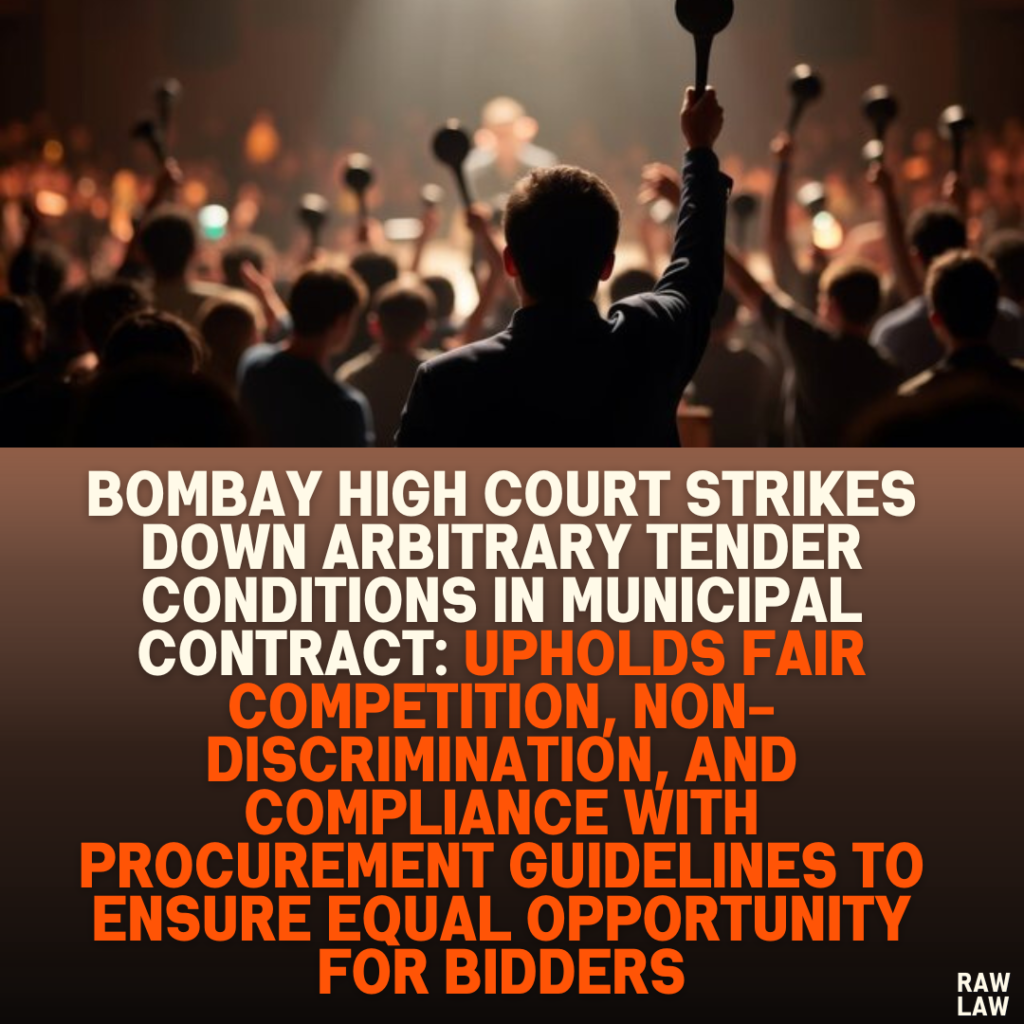Court’s Decision
The High Court ruled that certain conditions in the tender document issued by the municipal corporation were arbitrary and discriminatory. Specifically, the requirement of a minimum net worth of ₹100 crores and the reduction of the experience requirement from three years to one year were found to be unjustified. The court struck down these conditions and granted liberty to the municipal corporation to reframe them in accordance with fair and reasonable standards.
Facts
The petitioner, a proprietorship firm engaged in solid waste and biomedical waste management, had been awarded a municipal contract for sweeping and cleaning roads. This contract was extended periodically and was still ongoing. The municipal corporation later issued a new tender document for similar services, which included stringent eligibility conditions. The petitioner challenged three specific clauses:
- The requirement of experience in manual sweeping projects for only one year instead of three.
- The requirement that bidders must have supplied at least 1,200 sweepers.
- A financial qualification clause requiring a minimum net worth of ₹100 crores.
The petitioner argued that these conditions were arbitrary and designed to favor large firms while excluding smaller yet experienced contractors.
Issues
- Whether the tender conditions, particularly those related to experience and financial eligibility, were arbitrary, discriminatory, and violated Article 14 of the Constitution of India.
- Whether the municipal corporation’s justification for these conditions, including the anticipated workload during the upcoming “Kumbh Mela,” was valid.
- Whether the tender conditions conformed to existing government guidelines on procurement and financial qualifications.
Petitioner’s Arguments
- The impugned tender conditions contradicted the municipal corporation’s own resolution, which stated that the tender should comply with the guidelines of the Central Vigilance Commission (CVC) and the State Government.
- The CVC’s procurement manual did not mandate a minimum net worth requirement for bidders.
- The Government of India’s Model Tender Document for Non-Consultancy Services prescribed a three-year experience requirement, whereas the municipal corporation had reduced this to one year.
- The contract mainly involved supplying sweepers and basic cleaning materials, and thus, a ₹100 crore net worth requirement was excessive and irrelevant.
- The conditions favored large corporate entities with financial muscle rather than experienced local service providers.
- The Supreme Court has repeatedly ruled that tender conditions must be fair, non-arbitrary, and in line with public interest. The petitioner cited the precedent of ICOMM Tele Limited v. Punjab State Water Supply and Sewerage Board & Anr. to support their argument.
Respondent’s Arguments
- The municipal corporation contended that the contract was crucial for maintaining public hygiene and cleanliness, and therefore, a stringent qualification process was necessary.
- The five-year contract would include the “Kumbh Mela” period, during which the city would see a massive influx of visitors, necessitating financially stable and well-equipped contractors.
- The net worth requirement of ₹100 crores was justified to ensure the bidder had the financial capacity to sustain operations over the five-year term.
- The experience requirement of one year was still a reasonable benchmark for ensuring the capability of bidders.
- The tender process aimed to attract experienced and capable bidders rather than limiting competition.
Analysis of the Law
The court reviewed key legal principles concerning tender processes, emphasizing:
- Government contracts must comply with constitutional principles of fairness and reasonableness (Article 14).
- Courts generally do not interfere in tender conditions unless they are manifestly arbitrary, discriminatory, or mala fide (Tata Cellular v. Union of India).
- The discretion to set tender conditions lies with the government, but such discretion must be exercised in a rational and justifiable manner.
- Past Supreme Court rulings, including Director of Education v. Educomp Datamatics Ltd., reaffirm that tender conditions cannot be arbitrary or unreasonable.
Precedent Analysis
The court relied on multiple Supreme Court decisions:
- ICOMM Tele Limited v. Punjab State Water Supply and Sewerage Board & Anr. – Held that tender conditions must align with fundamental principles of fairness and cannot arbitrarily exclude eligible bidders.
- Tata Cellular v. Union of India – Established that judicial review of tender conditions is limited but permissible if conditions are arbitrary or violate Article 14.
- Global Energy Ltd. v. Adani Exports Ltd. – Reinforced the principle that courts should not interfere unless the tender process is unreasonable or biased.
Court’s Reasoning
- The court found no reasonable justification for reducing the experience requirement from three years to one, as the CVC guidelines explicitly required a three-year threshold.
- The net worth requirement of ₹100 crores was excessive given that the contract did not involve significant capital investment.
- The municipal corporation’s justification related to the “Kumbh Mela” was found to be speculative, as it had already planned a separate tender for sanitation services during the event.
- The conditions did not align with the corporation’s own resolution, which mandated adherence to CVC and State Government procurement guidelines.
- The conditions appeared to favor financially strong firms over experienced local contractors, violating the principles of fairness and non-discrimination under Article 14.
Conclusion
The High Court struck down the impugned tender conditions as arbitrary and violative of Article 14 of the Constitution. The municipal corporation was granted liberty to reframe the conditions in a manner that ensured fair competition while upholding public interest.
Implications
- The ruling reinforces the principle that government tenders must be fair, reasonable, and non-discriminatory.
- Municipal bodies will have to ensure that tender conditions do not unduly favor large corporations at the cost of smaller yet capable service providers.
- The decision sets a precedent for challenging arbitrary financial qualification criteria in public contracts.
- The ruling may influence future government tenders, requiring stricter adherence to procurement guidelines set by regulatory authorities.



